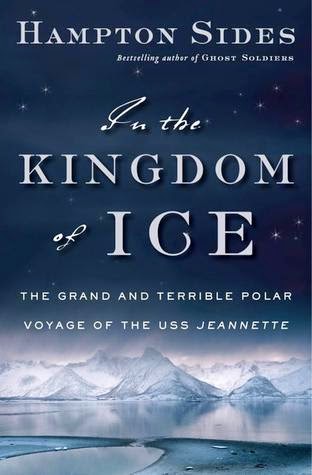In the Kingdom of Ice: The Grand and Terrible Polar Voyage of the USS Jeannette
Summary (from the publisher): New York Times bestselling author Hampton Sides returns with a white-knuckle tale of polar exploration and survival in the Gilded Age.
In the late nineteenth century, people were obsessed by one of the last unmapped areas of the globe: the North Pole. No one knew what existed beyond the fortress of ice rimming the northern oceans, although theories abounded. The foremost cartographer in the world, a German named August Petermann, believed that warm currents sustained a verdant island at the top of the world. National glory would fall to whoever could plant his flag upon its shores.
James Gordon Bennett, the eccentric and stupendously wealthy owner of The New York Herald, had recently captured the world's attention by dispatching Stanley to Africa to find Dr. Livingstone. Now he was keen to re-create that sensation on an even more epic scale. So he funded an official U.S. naval expedition to reach the Pole, choosing as its captain a young officer named George Washington De Long, who had gained fame for a rescue operation off the coast of Greenland. De Long led a team of 32 men deep into uncharted Arctic waters, carrying the aspirations of a young country burning to become a world power. On July 8, 1879, the USS Jeannette set sail from San Francisco to cheering crowds in the grip of "Arctic Fever."
The ship sailed into uncharted seas, but soon was trapped in pack ice. Two years into the harrowing voyage, the hull was breached. Amid the rush of water and the shrieks of breaking wooden boards, the crew abandoned the ship. Less than an hour later, the Jeannette sank to the bottom,and the men found themselves marooned a thousand miles north of Siberia with only the barest supplies. Thus began their long march across the endless ice-a frozen hell in the most lonesome corner of the world. Facing everything from snow blindness and polar bears to ferocious storms and frosty labyrinths, the expedition battled madness and starvation as they desperately strove for survival.
With twists and turns worthy of a thriller, In The Kingdom of Ice is a spellbinding tale of heroism and determination in the most unforgiving territory on Earth.
Review: I received a copy of this book as a giveaway on Goodreads.
This non-fiction work covers the voyage of the USS Jeannette, that attempted to reach the North Pole during the late nineteenth century. There was extreme interest in exploring the arctic during this time period, and it was considered one of the last unexplored areas of the globe. Some speculated that there was an open north sea, others believed in a popular 'hollow-earth theory.' Lt. George De Long and 32 men set out in an attempt to solve the riddle of the "polar problem" and advance the knowledge of our planet in the name of the United States.
As always, I'm amazed at the willingness of individuals to voluntarily sign up for expeditions where they know they very well may die. Before departure De Long told a crowd, "While we may be gone three years, we may be gone for eternity" (94). Sides explains that part of the appeal was the allure of exploration itself, however it was also a generational allure for these men. "Most of the applicants, like De Long, had just missed out on the greatest conflict in American history. These young men thirsted for some of the glory their fathers had won on the battlefields of the Civil War, and they yearned to test their manhood in some daunting and adventurous endeavor - if not war, then something roughly analogous to it" (108).
Sadly, most of the Jeanette's journey was fairly dull and mostly fruitless. Very quickly into their voyage northward, the ship became trapped in the ice. "They had been trapped in the pack for sixteen months now and had drifted thirteen hundred miles [...] Yet the route they'd taken was so convoluted, so full of jagged backtracks, that their present location was only three hundred miles northwest of the place where they'd first entered the floes" (187). Ultimately, the ship itself was lost, and the men were forced to travel by foot, over the ice, desperately trying to return home. Not all survived.
Once the ship was lost, this tale became gruesome quickly. The men are quickly starving and freezing to death. They're forced to kill and eat their sled dogs, and even begin gnawing on their shows. They're separated by a gale when they attempt to cross open water in their three small life boats. The effects of frostbite are severe: "A large hunk of putrefied flesh from the ball of his foot sloughed off and fell on the ground" (327). Obviously, not all survived the trek back to civilization.
The Jeannette's voyage did succeed in laying to rest many popular theories of the time, including the idea of an open polar sea. Also, the men discovered some new islands along the way, one of which is about sixty square miles in area. However, this was a very sad tale (although I knew this going in and the title alone gives that away). Although not everyone survived, considering the obstacles, I suppose its a wonder that anyone made it home. An interesting depiction of early exploration, and lives lost in the pursuit of furthering our scientific knowledge.
Stars: 3



Comments
Post a Comment